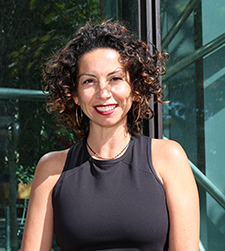Scientists at The Scripps Research Institute in San Diego have reported findings that could advance the search for an effective HIV vaccine and could also have implications for HIV cure research.
 Dr. Marcella Flores, amfAR Associate Director of ResearchThe researchers have developed a vaccination procedure to elicit a class of broadly neutralizing antibodies (bnAbs) based on the well-known VRC01. These potent antibodies are capable of neutralizing a broad range of different HIV strains.
Dr. Marcella Flores, amfAR Associate Director of ResearchThe researchers have developed a vaccination procedure to elicit a class of broadly neutralizing antibodies (bnAbs) based on the well-known VRC01. These potent antibodies are capable of neutralizing a broad range of different HIV strains.
In the lab, the researchers developed simplified versions of bnAbs, eliminating features that are hard for the immune system to produce and those that are “experimentally determined” to be inessential. In addition, they outlined a path to make a series of immunogens — substances that induce immune responses — to train the immune system to produce bnAbs against HIV.
bnAbs are produced naturally in 10 to 30 percent of people living with HIV, but years after infection. However, by that time the virus is too well developed and entrenched to eradicate. A vaccine that can stimulate the production of these antibodies before infection may be able to prevent the virus from taking hold in the first place.
Commenting on the study in the August 25 issue of the San Diego Union-Tribune, Dr. Marcella Flores, amfAR’s associate director of research, described the methodology as “very clever” and said, “broadly neutralizing antibodies are being looked at more and more not just for prevention but also for cure.”
According to Dr. Flores, in a “shock and kill” approach to curing HIV, a cocktail of bnAbs might be able to eliminate HIV from the reservoir where it hides in infected cells. The persistent viral reservoir presents one of the biggest obstacles to a cure. Should a potent latency reactivating agent (LRA) be found to “shock” HIV out of hiding, bnAbs could target the immune system to kill infected cells and eliminate the reservoir.
amfAR-funded researchers have previously reported intriguing findings based on their studies of powerful antibody cocktails that had the ability to reverse the seeding of the reservoir in monkeys. These findings have important implications for both HIV prevention and cure.
The Scripps study was led by veteran HIV researchers Ian Wilson, Dennis Burton and William Schief. It was published in the journal PLOS Pathogens.